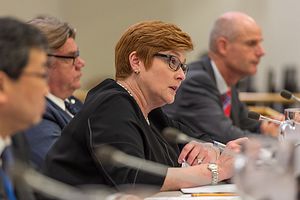The Australian government has called for the “immediate release” of Australian citizen Sean Turnell, who has been detained for the past year in Myanmar. Turnell, an Australian economics professor, was working as an economic policy advisor to civilian leader Aung San Suu Kyi when he was arrested last February, just days after the military coup against Aung San Suu Kyi’s government.
“Professor Turnell’s detention is unjust, and we reject the allegations against him,” Foreign Minister Marise Payne said in a statement timed to the anniversary of his arrest. “We once again call for Professor Turnell’s immediate release.” She added, “We will continue to work with international partners – and importantly those in our region – to press his case.”
A former staff member of the Reserve Bank of Australia and associate professor at Macquarie University, Turnell is the author of “Fiery Dragons: Banks, Moneylenders, and Microfinance in Burma,” a detailed history that tracks the development of the country’s financial system from the moneylenders of the British colonial period to the stagnation of Ne Win’s “Burmese Way to Socialism” and the rapacious marketization reforms of the 1990s.
After the handover to a civilianized government in 2011, a move that was accompanied by incipient economic reforms, Turnell started working with local economists and politicians to redress the economic damage wrought by a half-century of military dictatorship. After Aung San Suu Kyi’s National league for Democracy (NLD) took office five years later, he took leave of his academic post and began to advise the government on economic policy.
Turnell is one of nearly 12,000 people, and one of a handful of foreigners, who have been arrested since the coup, according to the Assistance Association for Political Prisoners. He has since been charged with violating the country’s Official Secrets Act for attempting to leave Myanmar with sensitive financial information, and if found guilty, faces a maximum sentence of 14 years imprisonment. The colonial-era statute outlaws the possession, collection, recording, publishing, or sharing of state information that is “directly or indirectly, useful to an enemy.”
The proceedings against Turnell have been characteristically opaque. Turnell has been unable to meet privately with his lawyer since being charged, while Australian officials have been blocked from observing court proceedings.
However, recent weeks have brought some hopes of a positive resolution of his case. Cambodian Prime Minister Hun Sen reportedly raised Turnell’s plight with junta leader Senior Gen. Min Aung Hlaing during his controversial visit to Myanmar in early January, apparently at Payne’s request. After the trip, Cambodian Foreign Minister Prak Sokhonn told reporters that Min Aung Hlaing “accepted the premier’s request in a positive manner.”
While the court “process” no doubt needs to run its course, the Myanmar authorities have the habit of arranging for the release and deportation of foreigners arrested on political charges. In November, the detained American journalist Danny Fenster was released on humanitarian grounds, six months after his arrest and three days after he was convicted and sentenced to 11 years prison. The most pressing question is whether Turnell’s proximity to Aung San Suu Kyi and senior members of the NLD will complicate a negotiated solution to his case.
In a statement released last week to the ABC, Turnell’s wife, the Sydney economist Dr. Ha Vu, expressed hopes that her husband would “finally have a chance to prove his innocence and he will be returning home as soon as possible.”
“To mark this ‘unwanted ‘ anniversary,” she added, “Sean and I wish the trial would proceed smoothly without delay and disruption, so that Sean can return home as soon as the judicial process is completed.”

































